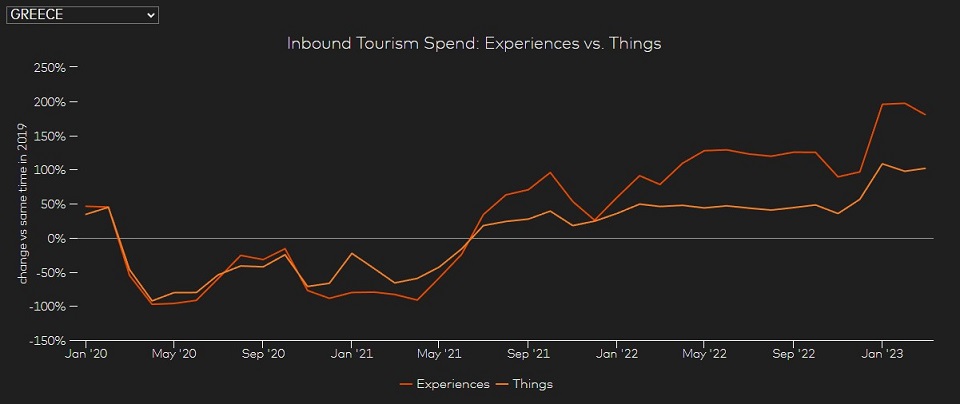
Tourists around the world are trying to make up for the time they “lost” during the pandemic, causing them to top their list of priorities in creating authentic experiences during their travels, even if it adds to the cost of their vacation. Greece, like other large and developed countries tourist sector, has the potential to benefit from this trend.
According to Mastercard’s Travel Industry Trends Survey, since the lifting of health measures due to the pandemic in most Western countries, tourists have increased their spending on special experiences such as luxury resorts, memorable events, culinary experiences, etc. compared to material values. things.
While this trend has remained stable last year, the big question in 2023 has been whether there will be a reduction in tourism spending on experiences and a return to consumption due to the lifting of strict health measures in China. And this is because Chinese tourists have always turned to material goods, investing heavily in products. luxury.
And yet, to the surprise of many, travelers in general continued to have a unique experience by prioritizing things. A Mastercard spokesperson told MR that this appears to be the case. structural changedriven not only by our desire to recapture the “lost” time of the pandemic, but also by a greater appreciation of the value of enjoying the moment.
What is the advantage of Greece?
This new dynamic is also strongly reflected in the Greek market, where since the beginning of 2022 there has been an almost constant deviation of tourism spending towards material experiences. According to the Mastercard report, this trend is usually observed in countries with a large and developed tourism sector, that is, outside of Greece and its competitors in Southern Europe, Spain, Italy and Portugal.

These countries have already adapted to serve those tourists who prefer luxury holidays, thus fueling the trend. As a Mastercard spokesperson commented to MR, Greece in particular is already seizing the opportunities associated with this trend. And that’s because they are. related services and infrastructure designed for those guests who are willing to dig into their pockets, whether it be luxury hotels or unique culinary experiences, especially spas and unique events.
Of course, as noted in relevant studies, the macroeconomic environment will continue to determine the consumer behavior of tourists. In 2023, in particular, and as inflation slows further, tourists may increasingly turn to unique experiences.
However, this rule will not apply universally: tourists traveling from countries with low real wage growth or declining real wages are more likely to opt for lower cost services and products. “price of money”. This trend is already being observed among European tourists who prefer to choose the cheapest brands in supermarkets, go to inexpensive restaurants and fly low-cost airlines. According to Mastercard, the buying behavior of European tourists will continue this summer and, of course, until wages and inflation balance out.
Source: money review
Source: Kathimerini
Lori Barajas is an accomplished journalist, known for her insightful and thought-provoking writing on economy. She currently works as a writer at 247 news reel. With a passion for understanding the economy, Lori’s writing delves deep into the financial issues that matter most, providing readers with a unique perspective on current events.